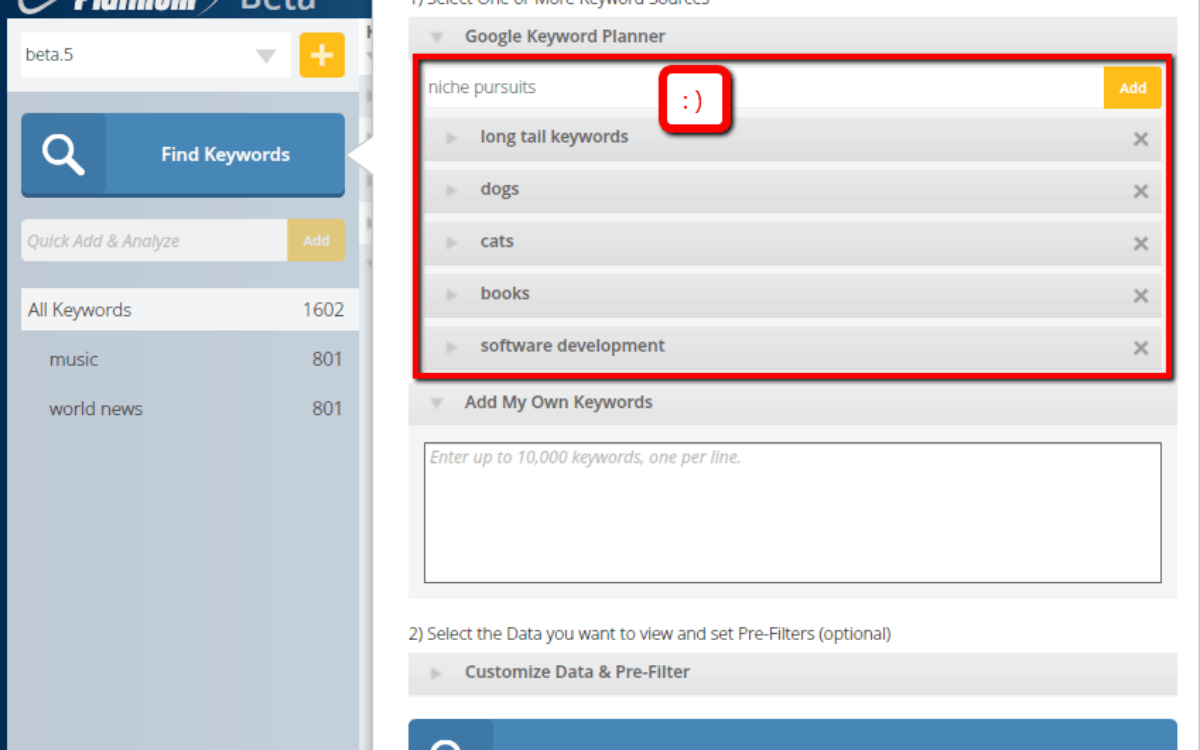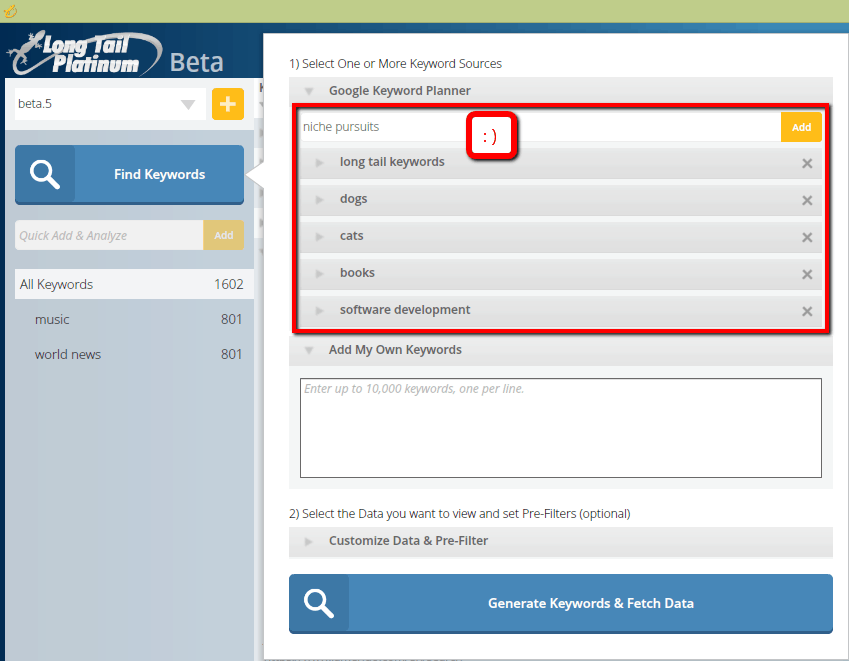How to Start a Successful Software Business: A Guide for Non-Technical Founders

When you buy something through one of the links on our site, we may earn an affiliate commission.
If you are interested in learning how to start a software company, you've landed on the right spot. If you are a non-technical founder that wants to bootstrap your way to success, then even better.
I'm going to share with you how to start a software company, but also share how I was able to start multiple software companies even though I'm a “non-technical” founder.
I have been running successful software businesses since 2011. However, up until this point, I have not taught others how they can get their own software business off the ground.
The time has come for me to share how to bootstrap a software business and the MANY lessons that I've learned along the way.
In addition, it's time to tell the story of Long Tail Pro.
I am the founder of Long Tail Pro; a keyword research software started in 2011. This business was very successful for me. I had the opportunity to exit a majority stake in that business in 2016 and I did.
Building, growing, and selling a software company from the ground up has taught me quite a bit along the way.
In addition, I founded in 2019 and am actively growing Link Whisper, another software company.
I have had success in several different business ventures (unrelated to software), however, my software businesses have been by far the biggest success story of all my businesses.
As a result, I'd like to give a little more insight into what has worked well for me and how you can also start a software company.
How to Start a Software Company
I purchased the domain LongTailPro.com on June 2, 2010 (the software actually launched publicly in early 2011). When I started that company, I had never worked for a software company and had certainly never run my own software company.
I was a business banker with no coding experience. I also didn't have piles of cash sitting around.
I had to learn how to start a software company from scratch with no experience. Now that I look back, I can certainly see that I made a few mistakes along the way, but I also did a lot right.
I'd like to share with you the 5 steps that I feel like are the best way to start a software company (and hopefully help you avoid the same mistakes I made).
1. Think: Make Something Useful and Better
2. Develop: Hire Great not Cheap.
3. Launch: Bootstrap using email list and active communities
4. Connect: Grow with content
5. Expand: Grow exponentially with promotions and funnels
Why Software?
So, you are thinking about bootstrapping a software business? First of all, “Congrats!” I think a software business offers a lot of advantages over other businesses that I think are important to point out.
First of all, software can have very high profit margins. Especially if you are selling the software online or through instant download, the product cost of “shipping” one more piece of software is basically zero.
This is obviously NOT the case for businesses involving physical products.
On the same note, software is essentially something that is created once, and then can be sold an infinite numbers of times after that. You won't ever run out of inventory.
(The reality is that software isn't created once, but requires constant updates…however, it's still better than holding inventory!)
Finally, software businesses don't have to be created by software developers!
I am not a programmer!
I don't know how to code anything. However, I own a successful software business.
Don't limit yourself into thinking that you cannot create a piece of software simply because you don't know how to code.
Hire someone.
If I said to you, “Hey, I'm going to buy some land and build a house”…it's most likely that I mean that I'm simply going to hire a contractor to build the house for me. It's not a big deal and people do it all the time.
In the same manner, you can just hire a developer to build a piece of software for you and you will own it (just like your house). The “contract” developer just want to gets paid for his work, not to “own” another house software business.
For now, just realize that a software business can be excellent for MANY reasons, and it's well within your reach…even if you have no clue how to code.
1. Stop and Think: How to Validate Your Software Business Idea
Before you dive into hiring and building software, you need to stop and think for a minute. The most important aspect of getting started is to find a way that you can bring the world something useful or better than the existing competition.
I know this sounds obvious, but I'm surprised how many software companies that are started that really aren't any better than what is already out there. If you take the time to research what is out there, I'm sure you can come up with a better idea. Check out our list of software business ideas for inspiration.
Solve Your Own Problem
There are so many ways that you can brainstorm for new software ideas. However, I can only share what has worked well for me.
The idea for Long Tail Pro came to me because I was trying to solve my own problem. You see back in 2008 and 2009 I was actively building small niche sites. As a result, I was doing A LOT of keyword research.
The keyword research tools I was using (Market Samurai and Google Keyword Tool) had some limitations when it came to doing LOTS of keyword research quickly. I was spending hours and hours performing repetitive tasks with this software and I was continually frustrated!
These tools were slow and truly felt like they were built by people unfamiliar with keyword research (like a software guy decided to just create a keyword tool without REALLY understanding how people do keyword research).
I had a problem. I was “wasting” hours doing keyword research with tools that didn't work well in my work flow.
After doing lots of research, I was still unhappy with the other solutions that were on the market. I felt like it was time for someone that actually did TONS of keyword research to create a better keyword tool.
I wanted to solve my own problem.
Now, there are LOTS of other ways to come up with software product ideas; however, I recommend trying to solve your own problems. This has worked very well for me as I created Long Tail Pro and Link Whisper by doing just that. And there are countless other businesses out there that came about by the founders solving their own problems.
Be Different From Your Competition
So, the first step in creating a software business is finding that great idea. However, simply because your idea solves your own problem, doesn't mean it's automatically better than what is currently on the market.
Now is the time to go out and research what other products are already trying to solve the problem that you are having.
For example, with Long Tail Pro, I was particularly frustrated with the length of time it took to search for lots of keywords on existing tools. As a result, one of my primary ideas was to simply allow users to input multiple seed keywords at once.
This is a very simple feature that was different than my competitors.
For example Market Samurai, a well known keyword tool back in 2010, only allowed users to input 1 seed keyword at a time (and it still only allows 1 seed keyword at a time).
Here's a screenshot of Market Samurai:

Sadly, I can only input “dog collar”. I have to fully start a new project if I want to search for something other than “dog collar”. It's extremely time consuming.
So, when I compared directly to my competitors, I KNEW I had something different. Long Tail Pro would give users the ability to search for lots of keywords at once and I also streamlined lots of the filtering and research options.
Here's a screenshot of an early version Long Tail Pro:

So, does your software idea stand out from your competitors in any way?
It needs to be either faster, easier to user, cheaper, work better, or address a pain point of users that isn't fully being addressed.
Check out our list of IT business name ideas for naming suggestions.
Competitors Making Money?
Okay, so you've solved your own problem and you've even figured out how to make a software product different from your competitors.
However, now you need to determine if anyone is actually interested in buying a product like yours!
The easiest way to find out if there is a market for your product is to find out if your competitors are making any money. If people are interested in your direct competitors product, then they will likely also be interested in yours (if you can convince them to buy yours first).
In some instances, finding out if your competitors are making money can be relatively easy.
For example, when I was considering whether or not I should create Long Tail Pro, I knew that one of the top keyword tools was Market Samurai. I got on their email list.
It just so happens that the founder of Market Samurai TOLD me how much the business was making! I didn't ask him, he just publicly revealed it to everyone on his email list. In fact, he did it on 2 different occasions.
(Remember, these emails are from way back in 2009 or 2010…I had to do some digging to find them).
Here's one:
In this first email, he simply explained that the demand was “mind-blowing” and that over 18,000 people had used the software in the first week. Whoa…that's alot of people!
But another email REALLY told me how well the business was doing:
So, by simply joining his email list, I was able to find out that my direct competitor had made $6.7 million dollars from the software product.
The answer was pretty clear to me: my competition was DEFINITELY making money! As a result of these emails and other research, the decision was crystal clear to me…I should definitely create Long Tail Pro.
You may have to do some more digging to find out if your competitors are making money. However, if you can find anything that references sales, user base, website traffic numbers, or other stats, you can often extrapolate how well the business is doing.
I also want to emphasize that seeing your competitors making lots of money is a GOOD thing! Having a healthy market of buyers (even though they are currently buying your competitors products) is better than not truly knowing if there is a good market.
Step 2. Hire a Great Developer (Not Cheap)
If you are not a coder yourself, you'll need to hire a software developer to get your business off the ground. I've hired several developers as a non-technical founder and here's the lessons I've learned.
- It’s easier to work with someone that speaks your language and lives in the same time zone. You might consider only hiring a native English speaker that lives in the US.
- You need to do a good job of describing what was expected out of the job. Who will own the source code? Does the job include creating a software licensing and security system? And an ongoing agreement for fixes/updates to the software?
- Hiring cheap might get something workable (for a short time), but the best developers charge more for a reason. Focus more on hiring the best developer you can find, rather than price shopping.
You can learn more of the ups and downs I've had as I learned to hire a developer here.
Now, there are lots of places you can go to find a great developer. I've listed a few ways below.
Freelance
You can find great freelance developers that will give you a quote to complete your entire project or work on an hourly basis. The advantage of a freelance developer is that they are a contractor and not on your full-time payroll forever.
They only work when you have work for them to do.
Many freelance coders exist in the world and they range from extremely talented to severely under-qualified to be bidding on your project. My advice is to do a phone call with your top few candidates and make sure they can communicate well with you and understand your job well.
You can find freelance developers at:
- Upwork.com
- Freeeup.com
- Github Jobs
- Stack Overflow
- Fiverr (for lower end jobs)
- many other places
I personally have used Upwork to find lots of great talent. Depending on the complexity of your job, you may be able to hire someone overseas at a lower rate than the equivalent US based developer.
Full-time
Are you ready to hire a full-time developer right out of the gate to get your software company off the ground quickly? Well, there is no shortage of places to go find the talent you need.
In addition to the places listed above (which can also potentially lead to full-time hires), there are other job sites like:
- Indeed.com
- Glassdoor.com
- Monster.com
- CareerBuilder.com
- LinkedIn.com
Agencies
You can also work with either software development agencies or with talent agencies to help you find the right person for your job.
A potential reason you might want to go with a software agency is that they might be local. You can likely find a company in your local community that is willing to work with you. This can be advantageous if you want to meet in person and really get to know who you are working with. And of course, you are supporting your local community.
So, consider doing a search in your area and you might find what you are looking for.
However, there are also TONS of other companies that are willing to work remote for you as well. Here's just a couple:
- TopTal.com
- Clutch.co
- Brights.io
Technical Cofounder
Another potential option if you would rather give someone ownership in your company as opposed to just paying them cash out of pocket is to find a technical partner. A typical arrangement would be that you would give them ownership stake in the company (potentially 50/50) and then they either work for “free” or for a very low rate.
You would have to negotiate the details with them.
I've never personally gone the technical founder route, perhaps because I'm just more greedy and always wanted to keep 100% ownership of my companies.
Places to look for a technical founder:
- Family and friends (and referrals from family and friends)
- Local business or networking groups
- Cofounderslab.com
- FoundersNation.com
- Angel.co
- IndieHackers.com
- Co-Founder on Reddit
Want to learn step-by-step how I built my Niche Site Empire up to a full-time income?
Yes! I Love to Learn
Learn How I Built My Niche Site Empire to a Full-time Income
- How to Pick the Right Keywords at the START, and avoid the losers
- How to Scale and Outsource 90% of the Work, Allowing Your Empire to GROW Without You
- How to Build a Site That Gets REAL TRAFFIC FROM GOOGLE (every. single. day.)
- Subscribe to the Niche Pursuits Newsletter delivered with value 3X per week
My top recommendations



















58 Comments
Conversation
Great work, Spencer! When the new version of LTP will be available?
Thanks Velinsky. Several users are beta testing v3.0 of the software now. It will be a couple of weeks before it’s available to all existing owners.
You did good job on the software mainly the marketing part. Especially when you came accross some affiliate manager.
I think most of your sales is coming from affiliates? right?
I just released my plugin for WordPress “WP Suggester” (convert visitors to customers and leads with quizzes) and it’s hard to do all the work by yourself (Developing, Marketing, Design and etc).
I tested out the need and people like it, I truly believe my plugin will succeed with good marketing approach and improving it (the same like you do for Long Tail Pro). Right now I am getting traffic already and people starting using. I am really excited to see how it goes.
Great start on your software blog posts series. I have been waiting for it.
Cheers,
Yaro
Thanks Yaro. Actually most of my sales do not come from affiliates. I just checked my stats, and about 31.5% of sales come from affiliates. So almost 70% of sales is from my own efforts or other non-affiliate sources.
I ran the business from 2011 to 2013 with NO affiliate manager. I used an affiliate manager for a one-week sale in 2013 is all. So, he worked with me for about a week. I’ll definitely be covering all of this in more depth in future posts in this series, so stay tuned 🙂
This is great, I though the software started succeeding after you hired aff manager and you still working with him.
Will wait for next post.
Spencer,
I love this blog! I have been following you now for about a year, you have totally inspired me to do some of the same things.
As a programmer/developer I totally agree with you about not needing to know how to program in order to build a piece of software. You just need to know enough in order to delegate the task out and not be BS’d. I have a skill set that allows me to build apps/websites and software. But. Its not always beneficial for the business to have me spending all my time building my own products where I could just hire someone to build it for me.
Quick Question. When you started selling LTP, what kind of marketing efforts went into promoting it? Did you have the email list builder that you have now?
Also, please add the ability to add proxies to LTP ; ).
Thanks for all your insight, keep up the good work.
Yeah, proxy feature is missing that one major thing i don’t like in LTP
Thanks Matthew! I agree that you don’t need to be a developer…the real hard part of the business comes in idea generation and then even more so with marketing.
I will dive into all my marketing efforts. However, I launched Long Tail Pro BEFORE I started NichePursuits.com. I did have an old blog, but maybe only 1-2k email subscribers. I had a very tiny audience and I’ve grown organically over the years.
Your request for proxies is well noted 🙂 Thanks!
I am a developer.
this post is useful.
hopefully you post more.
Hi Spencer,
I’m following your “adventures” for a few years now… Once again, this article is really helpful and I hope that it will become a real motivation for your readers!
On my side, I’m also working on a software to help affiliates earning more commissions by avoiding Out-Of-Stock items : Commission Perfect!
Would you help me and share your thoughts on what we should do to make this tool a successful software ?
Thanks! So, the product is for affiliates worried about out of stock inventory? Or is it for sellers (owners of the product) doing inventory management? I didn’t look at the product much, but my first reaction is to make sure there is a market there. As an affiliate, I’ve never once thought about the product I’m selling going out of stock.
Also as noted in my blog post, you should verify that you have competitors in this market and that they are making money with their products.
Thank you for your answer Spencer!
Commission Perfect is for affiliates doing niche sites with amazon. It can both verify if the amazon product is available / out of stock and if the amazon affiliate link + tag are correct. Doing this manually is really time consuming…
It seems surprising that you never thought about this problem. What are you personally doing when you land on a website where the product you’re looking for is not available? You can’t buy it, so I guess that there is obviously a problem 🙂
Don’t you think that some of your websites have links pointing to out of stock products ? Such links can definitely hurt your revenue…
I have few websites and some of them had more than 35% of “out of stock” items. Replacing these dead links allowed me to significantly improve my commissions (not by 35% but it has been close to a 20% increase on 4 websites).
We actually have 1 competitor but after having tried its software, we decided to launch something better and more powerful, as far as we are able to do it… We are in our pre-launch step but we’re already providing email alert + holiday mode (an option that can detect and replace dead links on the fly)…
Great to know Long Tail Pro is doing well. I purchased it last month, and I am glad to say that it’s a great software. All the best to you Spenser with all your business endeavors!!
Thanks Vusa, I appreciate the kind words! No worries on the typo…happens all the time to me!
Oops. Spelled your name wrong Spencer. My apologies. I hope you are not offended. Sometimes we rush to click “submit comment” without proofreading. Lol.
Aloha Spencer,
I have a software business that meets all 3 of your requirements. I can’t wait to read all 5 parts. Like you, it’s a program that solves my own problem. It amazes me that no one has done it already.
When it comes to taxes and liabilities, is software still a better bet? I live in California, so getting a LLC is too expensive for a startup like me.
Thanks again for sharing.
Aloha Lee! (I’ll be traveling to Maui this summer…)
Taxes and liabilities are no more than any other business…depends on how much money you make. Forming an LLC is typically only a few hundred dollars…perhaps a bit more in CA; unfortunately, that is likely going to be a very minor expense for the overall business.
Great work I love this kind of post!
Thanks Joseph!
is it free upgrade?
Yes, anyone that currently owns Long Tail Pro will get a free upgrade to the new version.
I cant wait to read the next posts of this series. Keep up the good work Spencer!
Thanks Andreea!
Thanks for this post. It has given me ideas on how to solve some of my own problems.
Can’t wait for other series.
Awesome…good luck Pius!
Awesome post, Spencer. I have always wanted to hear you tell this story.
Love how you always have multiple projects going on at once, zigging when others are zagging.
Keep it up, man.
Thanks Mike!
nice post you killed it all and as for me I met all the criteria for problems people bring for me to solve, where I leave, most ladies are always asking me to help them out.so I felt I should hire someone out and try my luck.
I am really glad you’ve found success with LTP, Spencer. I’ve benefited a lot from using it.
The authority site i’m building right now is very much in line with my interests but I wouldn’t have created it if I hadn’t found out how wide open of an industry it is.
It took me stumbling across some keywords in LTP before realizing. I chanced on some keywords relating to the target market and my jaw almost dropped when I saw plenty of keywords that were in the 9-18 avg. KC range.
Registered a domain that day and have been building my site out ever since!
Thanks for that!
Wow, that’s great Loren! It’s pretty rare to find a bunch of keywords in that low KC range…nice.
Hi Spencer,
I’m following you blog since I found almost the same story of mine in your “about me” section of NP. Me too quit my job after finding an alternate income through online business. But the only difference I found in you and me is the success you have now, which I couldn’t achieve. This blog-post inspired me a lot ,as always, but with a difference of being it on the right time as now I am trying to build a good software product for my business, after few of my failed attempts. In spite of being a software developer my self, I’m trying to get a reliable freelancer to over come my “shiny object syndrome” and found your your post very much inspirational.
Thanks for your inspirations and looking forward to read more about your success on software business(especially about the development phase challenges).
Thanks Paulson…best of luck!
Awesome. This is something I have been waiting for.
Hey Spencer! This is really useful content – thanks so much for sharing it with us. I particularly liked the analogy of hiring a software developer being akin to hiring an architect to build your house.
I’d never really thought it was a viable business model to outsource software development if you know nothing about coding. I just wouldn’t be confident to rely so much on someone else, but thanks to your analogy, it makes perfect sense!
The only part I wasn’t in complete agreement with in your post was the bit about it being easy to work out how much your competitors are making. It’s a fair assumption to make that the Market Samurai founder was grossly exaggerating his figures to make his product appear more successful. I just don’t think you can reliably confirm whether a product is successful or not by listening to the person who’s trying to sell the product.
Either way, I’m really looking forward to the rest of this series. I’m a big fan of your podcast and how open you are with your progress on all your projects.
Cheers,
Mark
Thanks Mark, glad you like the analogy. Whether or not you know exactly how much a competitor is making, its still important to do what you can to find out if there are successful players in the market.
Thanks for this Spencer! I was about to contact you requesting mentorship/coaching on this aspect. I’m an academic with ideas for a software product. Looking forward to the next installment.
Thanks AllyG!
Before start blogger you must familiar with keyword research tools. thanks for sharing you info.
Love to follow this kind of posts. You are “just” writing about what you did experienced. Very valuable for me to get information like this.
Rock on Spencer!
Thanks Stefan!
When you publish beta version of LTP? look it very awesomeone.
Very soon. Within the next week or so to existing users.
Very good. I see the biggest problem is we start. One thing I learned is that we must begin, even if slowly, because the important thing is the direction and not the speed.
Hey Spencer!
Great article and looking forward to the series… for sure!
I’ve been using LTP for years now and it’s been truly instrumental in my Client SEO business… so thank you for that!
Also – I’ve recently entered the SaaS industry and have to say that it’s been a blast so far.
Thanks again & I look forward to your coming posts!
Brian
Hey, Please have a post about supporting Long Tail Pro. For example you just released LTP 3.x but there is no documentation on how to use the new interface. I am trying to return results like I did with 2.x but having trouble. I realize this is probably obvious to you and your programmer. How about updating your video on your main sales page? http://www.longtailpro.com
Video on homepage is updated. We are in process of updating all tutorial videos. When we released v3, we did send out a demo video in the announcement email.
I’d like to echo Bill Goodman’s request… I’m very excited about the update to LTP, but I’m not sure how to use it, and I can’t seem to find how many searches each keyword has. Could you make a ten-minute video showing us how to use it? Thank you, Spencer!
Sorry to hear that you and Bill missed the announcement email with the demo video. Here it is: http://longtailpro.com/Videos/v3beta/v3beta.mp4
Saw the demo and used the new version—AWESOME! That sorting functionality is fantastic. The video helps too. Thanks Spencer!
Great post! Really looking forward to the coming posts!
Quick question: As I am building my own niche software product for businesses and preparing a mockup video, did you interview any potential users to find out their pain, etc.?
Should you be in Berlin anytime, let me know.
Best,
Daniel
I think interviewing potential users if a fantastic strategy. I didn’t for Long Tail Pro simply because I was a heavy keyword researcher myself and was very involved in forums at the time, so the pain points were pretty clear to me.
I’ll let you know if I ever make it over to Berlin!
Hey Spencer,
Cool post as usual.
Question: What do you use to create the red boxes and arrows on your example images like the example images above?
Cheers!
I use the free tool Jing: https://www.techsmith.com/jing.html
wonderful post spencer, i just bought it last month and i haven’t figure out how to drive traffic with a long keywords. can you please give me some advice? all of the kc that i get is from 18-25. and the targeted country is us. all my post have these long keywords. title, description and url. hope you can help me. thanks!
calculator KC on LTP new is higher LTP old ?
See this blog post; just depends on keyword: http://www.longtailpro.com/how-is-keyword-competitiveness-calculated-in-long-tail-platinum/
Hi, this is an extraordinary site with a lot of shared valuable information.
Could someone tell me how could be an application for an ecommerce site, please? What kind of function it has to fulfill, for example or how should it be?
Or could you tell me, please where can I found trustful information about this?
Thank you
Spencer you have provided good guide to start a software business. But we should not only depend on offline projects. We should hunt for online projects in freelancer sites. There are bunch of companies earning more by online projects. Thanks for the article.